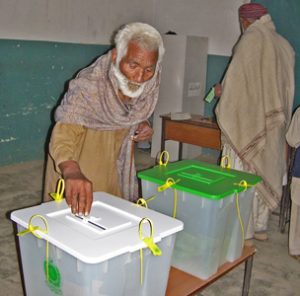 Last week’s by polls and Senate elections demonstrated that democracy in Pakistan is maturing.
Last week’s by polls and Senate elections demonstrated that democracy in Pakistan is maturing.
Both sets of elections were carried out with relatively little controversy compared to past elections. During the by polls, there was the tragic incident of PTI supporters opening fire on PPP workers celebrating a victory in Multan, the confusion over NA-140 results, and of course the case of Waheeda Shah’s slapping an APO. But isn’t it a positive trajectory if we have entered a phase in our democracy when the most controversial incident is a mere slap?
The Senate elections too went off without much incident. Despite accusations of some that there was massive horse trading and deal making the affected the outcome, the results paint a different picture. PPP’s diehard activist Aslam Gill lost what was supposed to be a secure Senate seat from Punjab. Sure some secret conspiracy to rig the outcome of elections would have prevented such a result. Actually, Gill’s loss is hard evidence that the polls went off more fairly than in the past, as were reports that PML-N’s position was strengthened by the results as well.
Most importantly, though, the elections happened. Despite all the doomsday predictions of coups and Parties fielded candidates, organised their supporters, and officials were elected according to the process defined in the Constitution. By all accounts, there was no major interference from agencies or institutions and a democratically elected Senate is in place through 2015. Calls for boycotting the by polls went ignored by the masses demonstrating that they are more interested in leaders who are willing to work towards real solutions than those who know nothing but protest politics.
With this, the stage is set for the next general elections in which the masses will once again make their way to the ballot box and the nation is preparing, for the first time in our history, to transfer power from one democratically-elected government to the next.
The elections in 2008 were not flawless, but they were the beginning of a new era. Since that historic shift, we have seen each following election carried out with fewer incidents and less controversies. Regardless of which party each voter supports, it is clear that that is overwhelming support for the democratic process. And with that, we all win.
![]()






It is the democratic consensus that gave strength to the armed forces to fight the terrorists. It is the consensus developed by all leading political parties that is challenging religious extremism and cutting across the sectarian divide.
Failure to control law and order and poor governance is not the failure of democracy. Many countries are faced with these problems but there the government is blamed for its poor management instead of questioning whether the country should have democracy or not. The solution lies in democracy, which allows voters to push their elected representatives to perform. And if they fail to do that, the voters are free not to elect them again. In contrast in a dictatorship, neither can you push the bureaucrats and nor can you dislodge them through the vote.